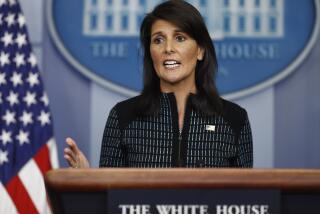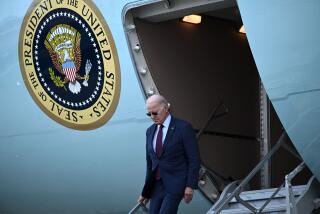Romney’s challenge: Be more than the anti-Obama
Day after day, Mitt Romney sketches a bleak portrait of America under President Obama and vows to dismantle his programs. Romney would undo Obama’s healthcare overhaul, scrap Obama’s plan to scale back the military and lift Obama’s restraints on banks and Wall Street investment firms — to name a few.
But apart from casting himself as an all-around anti-Obama, Romney has offered scant evidence of a distinct positive message to capture his vision for leading the country.
The absence of any strong sense of what a Romney presidency would mean for the nation is an important part of a larger challenge that he faces: to connect with the many Americans who have been reluctant to embrace his candidacy.
Campaigning on a snowy morning last week in Colorado, Romney summed up his core message at a rally in an RV warehouse, and it was not about himself. It was about Obama: “This has been a really failed presidency,” he said.
Aside from promising to lance Obama’s policies, Romney conveyed little about how he would govern, relying instead on abstract pledges to stand up for freedom.
Romney’s effort to contrast himself with Obama is born of political necessity, as the first hurdle for any candidate challenging an incumbent is to show that failure has opened the door to a change in the White House. (So too are his frequent attacks on GOP rivals Rick Santorum and Newt Gingrich, since he must dispatch them to gain the nomination.)
Complicating Romney’s message is a central tenet for Republicans this year: that the size and scope of government should shrink. Democrats have succeeded in past elections by selling a raft of programs to expand government services. But building a vision on cutbacks has required a deft touch.
Ronald Reagan, a president often cited by Romney as a model, pulled that off in 1980, offering a positive argument that blended both confidence and optimism.
Reagan framed his campaign to oust Democratic incumbent Jimmy Carter around themes of hope, leadership and national strength at a time of economic stagnation and the protracted humiliation of the Iran hostage crisis.
Reagan’s skill at communicating that message was crucial, and “that’s not one of Romney’s pluses,” said Stuart Spencer, who was a longtime campaign strategist for Reagan. If Romney succeeds in defeating rivals for his party’s presidential nomination, Spencer said, he would be well advised to firm up an easily grasped agenda to present to swing voters.
“Those are the people who like to see a plan, who like to see a vision,” he said.
In September, Romney released a 59-point plan to revive the economy. Beyond boilerplate Republican plans to cut taxes, slash regulations and shrink the federal workforce, it covers a wide spectrum, including a reversal of Obama’s plans to fight global warming and sharp reductions in the Medicaid healthcare program for the poor.
But Romney has yet to distill that sweeping agenda into shorthand that voters can remember.
“I follow this pretty closely, and I’m not sure I could name a half-dozen of the 59 points,” said Republican pollster Whit Ayres, who urged Romney to strike more of the inspiring notes of his New Hampshire primary victory speech.
Borrowing directly from Reagan, Romney used that speech to wrap his Obama attacks in optimism. “Americans know that our future is brighter and better than these troubled times,” he said. “We still believe in the hope, the promise, and the dream of America. We still believe in that shining city on a hill. We know that the future of this country is better than 8 or 9% unemployment.”
After he lost Republican contests last week in Colorado, Minnesota and Missouri, Romney made clear that he recognized a need to convey more positive information about what he believes and to better define what makes him uniquely suited to lead the country.
In his Denver concession speech, Romney resurrected a story he told in his 2008 presidential campaign about his father, George Romney, who was governor of Michigan and chief executive of American Motors. He said his father, who never graduated from college, apprenticed as a lath carpenter and knew how to hold nails in his teeth and spit them out, pointed end forward; his father also sold paint to help pay for his own honeymoon.
Yet while the story demonstrated a familial persistence — and the fact the family’s wealth isn’t generations old — it did nothing to flesh out what a Romney presidency would mean for the country.
At a rally in Atlanta the next day, Romney told another story that he saves for rare occasions, sharing recollections of ministering to fellow Mormons whose unemployment led to depression or marital problems.
But even then, he used the story as a device to slam Obama, not to illuminate his proposals. “Being out of work a long time is a real threat and challenge to human happiness, and I feel this president’s let us down,” he told a couple hundred supporters in a stone countertop showroom.
Tad Devine, a Democratic strategist who advised Sen. Edward M. Kennedy in his 1994 reelection campaign against Romney, said Romney’s approach then was similar.
“We had an easier task defining him, because he hadn’t defined himself,” Devine recalled. “He’s a cardboard character right now, and that’s why he makes an easy target.”
An overt Romney rationale will become even more important if his primary selling point — that he alone has the experience to resurrect the economy — weakens as circumstances improve under Obama.
Robert R. Reilly, a former Voice of America director who served as a special assistant to Reagan, argued in a Wall Street journal essay last week that Romney’s lack of what President George H.W. Bush called “the vision thing” posed a serious risk to his campaign.
“The economy is the only thing in his quiver,” Reilly said. “If it keeps improving, he will be empty-handed before the Obama onslaught.”
More to Read
Start your day right
Sign up for Essential California for news, features and recommendations from the L.A. Times and beyond in your inbox six days a week.
You may occasionally receive promotional content from the Los Angeles Times.







